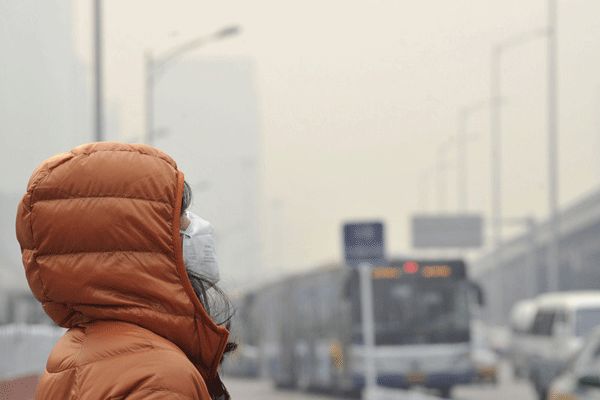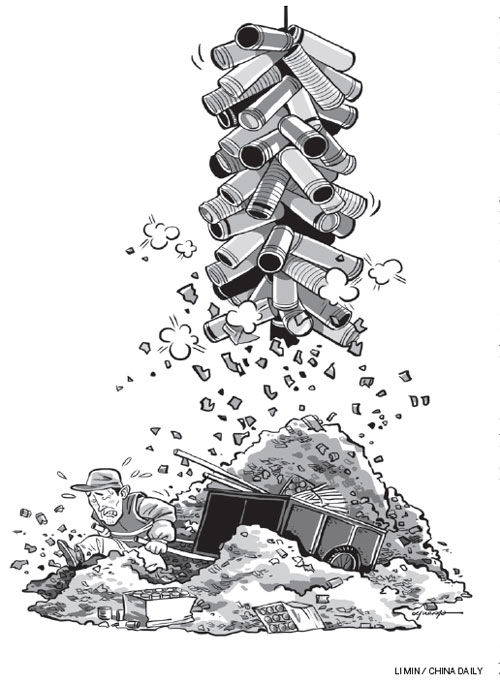An issue beyond firecrackers and cleaners
By Wang Yiqing (China Daily) Updated: 2015-02-17 07:50
 |
|
A woman wearing mask looks up into the hazy sky in Beijing on Wednesday. Beijing issued a smog alert on Wednesday, days after the conclusion of the APEC summit. The hazy smog is expected to disperse tomorrow. [Photo/IC] |
A photograph of two elderly street cleaners holding a heart-shaped card with a message that appeals to young people to set off fewer firecrackers so that they could return home earlier to celebrate the Spring Festival has gone viral on Chinese social media. Like some other online hot topics, the cleaner-couple's plea has drawn netizens into a debate on social issues.
The street cleaners' plea has a simple meaning: Fewer firecrackers mean less cleaning to do and thus earlier return home for the Spring Festival. It's understandable that, as an elderly couple, they cherish the chance of spending some time with their children, grandchildren and other relatives. No wonder, the couple's appeal has moved a lot of netizens, with many urging people to sympathize with street cleaners and cut back on the use of firecrackers.
Not surprisingly, "firecrackers" have drawn the attention of environmental activists, who have joined the plea for setting off fewer firecrackers to also minimize air pollution. With air pollution worsening in many regions of China, the appeal has elicited many people's support.

And as expected, public discussion on the issue has again extended to the traditional once-a-year debate on the very need to set off firecrackers. The battle lines, to use a cliché, are drawn on firecrackers, with defenders of traditional culture against any restrictions. Some have even criticized the appeal as "moral blackmail" on the pretext of helping elderly laborers. Others say that adhering to the elderly couple's plea would be unfair on other laborers who have to work during the Spring Festival despite being equally desperate to return home for family reunions.
The street cleaners' photograph is indeed touching and firecrackers are indeed detrimental to the environment, but it is still difficult to take sides in the debate because it is a mesh of different issues. Even people who are in the same camp have different reasons and motivations for taking their stand. And it's highly possible that they don't even know what they are really arguing about.
Since laws and regulations allow people to set off firecrackers on specific occasions, the anti-firecracker camp can only promote its idea and persuade the opposite camp not to celebrate Spring Festival with firecrackers. Respect for grassroots laborers and understanding their problems are one thing, and forcing others' to give up their rights is quite another.The real issue the cleaner-couple's photograph has raised is not whether we should or should not set off firecrackers, but how we can reduce the work pressure of street cleaners during the Spring Festival. Firecracker fans have the right to indulge in their type of celebration but they should not cause problems for others and try to leave as little rubbish as possible in the streets. This is not only to ease the burden of street cleaners, but also to fulfill their duty as responsible citizens.
Even though restricting firecrackers is a debatable issue, the authorities should pass regulations on cleaning the garbage left by firecrackers, such as requiring people to set off firecrackers at specified sites and clean up the rubbish in order to ease the burden of street cleaners.
Another reason why the couple's plea has gone viral is that people know how tough the working conditions of grassroots laborers, especially street cleaners, are. There is a serious discrepancy between street cleaners' meager income and their heavy workload and tough working conditions. It is good to help street cleaners, but we should realize that "chicken soup for the soul" style appeals are not the type of help they need.
The real way to help street cleaners is to seek improvement in their working conditions, protection of their rights and interests, and increment in their salaries. And all this can be done by the authorities.
The author is a writer with China Daily. wangyiqing@chinadaily.com.cn

I’ve lived in China for quite a considerable time including my graduate school years, travelled and worked in a few cities and still choose my destination taking into consideration the density of smog or PM2.5 particulate matter in the region.











